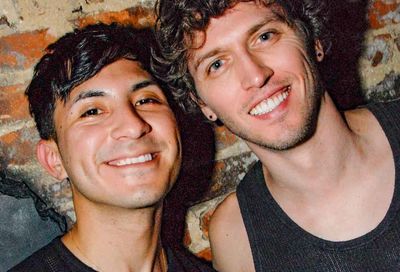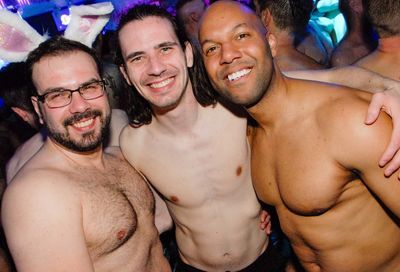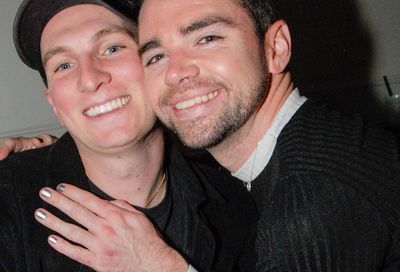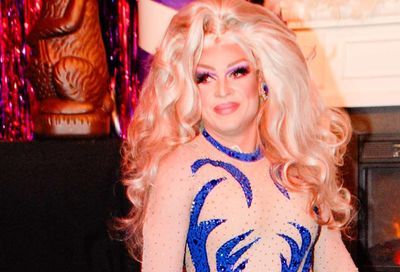Majors’ Party Opposition
D.C.'s second openly gay, and first Libertarian, mayoral candidate hopes to establish a viable opposition party

Bruce Majors cuts an unassuming figure across the table as he settles down at a local coffeehouse for a one-on-one interview. Yet the Libertarian Party’s nominee for mayor is blessed — or cursed, depending how you look at it — with a quick wit and a sharp tongue, often pressing people’s buttons with a sarcastic sense of humor that evokes giggles from listeners even as it stings its intended target. Never one to shy away from controversy or political incorrectness, Majors says what he thinks and means what he says. One of the more accessible candidates in a five-person race (though a sixth candidate’s name remains on the ballot), Majors is credited with helping to grow and expand the city’s fledgling Libertarian party, recruiting three times the number of competitors being fielded by the Republicans or the Statehood Greens.
While some are quick to dismiss Majors’ candidacy as a quixotic campaign against the District’s Democratic elites, Majors is smart, warm, willing to engage in debate and reasoned in his opposition to out-of-control government spending and regulations, cracking jokes and letting loose humorous one-liners as he diagnoses what ails the District. In spite of his exclusion from public polls and the four “official” debates and forums hosted by local media outlets, Majors, a realtor by trade, sees an opening for not only his candidacy, but his fellow party nominees.
“Almost 20 percent, or 17.5 percent, of voters in D.C. register ‘no party,’ even though that excludes them from voting in a primary,” he says. “And primaries are the real election in D.C. So those people, right off the bat, are saying, ‘I so much don’t like the choices I’m being offered, that I’m essentially willing to be excluded from all real D.C. elections.'”
For Majors, it’s important to provide voters — and District residents in their daily lives — with options and choice. And, after all, isn’t that what true freedom is about?
METRO WEEKLY: When did you first come to D.C., and what brought you here?
BRUCE MAJORS: I came here in 1980, and I was thinking about this earlier today, so I’m going to give you a teeny bit of interesting news that is probably only interesting to gay readers and I have not given to the Blade. I came here in 1980 to live with someone who’s a libertarian. We lived together for two years.
My ex is one of the plaintiffs on both the Heller decision and the subsequent gun control decision in D.C. to make it legal to own a gun here, which I think is a gay issue, because as long as there’s gay-bashing, when somebody is going to bash you, there should be a great cloud of uncertainty in their mind about whether you or your friend with you might have a gun.
MW: That was actually one of my other questions, about your position on guns.
MAJORS: I think broad numbers of people should be able to have a gun, and they shouldn’t have to wait for months to get one, either. Especially if there’s been any kind of threat against them. And I think people should be able to do concealed carry, too. And they have to apply, and the police have some time to do a check to ensure they don’t have a criminal record. You should apply, and if the police haven’t gotten done what they need to within so many days, your permit just becomes valid.
MW: When did you first know you were gay, and when did you first come out?
MAJORS: I think I knew I was gay when I was 10 or 11. I had a fairly religious family, and I think I might actually have decided I was an atheist before I was gay.
I’m trying to remember if I told anyone I was gay in high school, and I might not have. I don’t think I came out to anyone until I was in college.
MW: How do you think D.C. has been helped or hurt by one-party rule?
MAJORS: It is the case that we have all this corruption in D.C., and I don’t think that there are any cases of corruption, so far, where the first people to point them out were anybody in the D.C. government, or the D.C. Council, or the D.C. Democratic Party, or the D.C. Office of Campaign Finance,. Nothing they do is about actual corruption, it’s about how they want their own bureaucratic forms filled out. It’s just amazing to me that they can claim I’ve put a donation to myself on line A1 instead of A3, and that’s an important issue to them, but Jeffrey Thompson funded a mayoral campaign and it escapes their purview. I actually don’t think the Post or the City Paper or WMAL or anybody has broken anything. I think it’s been the FBI has uncovered something, or Tim Day, who when he did it, had not run for office yet, he was just a gay black Republican tax consultant. So all the corruption has been uncovered by private citizens or the FBI. But because it’s one party, I don’t think somebody on the city Council might say — I mean, Brianne Nadeau sort of did this because she was running against Jim Graham — “hey, that’s wrong.” Because if you’re one of theirs, maybe they figure you’ll retaliate? Like, if someone in the Democratic Party would actually go after the bad apples and get rid of them, I think that actually does happen in other state parties, because you don’t want them pulling you down, but here…
MW: If you’re not successful in winning…
MAJORS: Well, my aim of success, of course, is getting 7500 votes so we can keep ballot status and people can continue to register as Libertarians. That’s my actual goal.
MW: Why do you think you’ve been excluded from some mayoral debates or forums where Carol Schwartz has been asked to participate?
MAJORS: I think that they think it looks “fair and open” if you have three people, because in many races you don’t. So it’s okay to stop there, because you’ve “done enough.” I also think because she’s been on the Council. So essentially we have a race where NBC, The Washington Post, the Board of Trade, are willing to present you with people who have already been elected, which I think is a problem. It’s the same kind of problem we see across the District, of filtering people out, where it’s only people who have worked in a congressional office or a city Council office who can even run.
MW: You’ve received lower ratings from the Gay and Lesbian Activists Alliance for not favoring an active role for government when it comes to LGBT rights. What policies are already in place that can be utilized in place of legislation that they favor?
MAJORS: Well, I don’t want to commit myself to supporting any particular program just because GLAA supports it or wants to fund it. I think we want to focus on different issues that they ignore, like: one of the ways you can fight discrimination is by boycotting people or by starting your own business and going into competition with whoever discriminates against you. But you can’t do that in an overly regulated situation where it’s hard to start a small business.
One of the ways you deal with bullying in school is by being able to start your own school that doesn’t allow bullying or is specifically oriented towards students with a different body of interests — athletically, masculine girls, feminine boys, whatever they are. And so we actually think that school choice and charter schools are a gay issue that are overlooked because they don’t fit into the paradigm that is more government-centric.
Libertarians are all in favor of anti-discrimination ordinances in government employment. But in some people’s minds, I’m the same as a person who doesn’t support anti-discrimination ordinances at all, because I wouldn’t go along with them in prosecuting a mom-and-pop baker who refused to bake a gay wedding cake. Why is this a law and regulation issue? Why does every single private institution have to be forced into one single pattern, and possibly be open to some legal prosecution if somebody thinks they’re not following the rules?
MW: What are some programs or incentives in place that you think should be changed or repealed?
MAJORS: There is, apparently, a D.C. Office of Religious Affairs, that somehow has to do with the D.C. government dealing with all things religious, and I just think that sounds unconstitutional on its face, and I think we should get rid of it.
I don’t like the Office of Campaign Finance, because it doesn’t seem to me like they’ve ever stopped anything, and they impose costs on me through paperwork. I think we should raise the level below which you don’t have to report to $25,000 or $50,000, because if you’re spending under that amount in a D.C. campaign, Jeffrey Thompson and big corporations are not the people funding you.
It’s really hard to find the D.C. budget. I would like to see the entirety of that online so that anybody can read it and see what D.C. spends money on, which, right now, is totally not transparent. I would actually like to see it be overboard, almost to the level of if someone uses a D.C. government credit card to pay for something, it appears as a Google doc within a week.
Obviously, this isn’t a program, but I’d like to see all the money spent on prosecuting victimless crime like prostitution or drug use returned to the taxpayer or used to protect people from violent crime.
MW: A lot of this campaign has been focused on the personality of the candidates. Your opponent, David Catania, has been criticized for his temperament. Do you think that’s a bad thing, to have a temper?
MAJORS: No, I don’t, although I will tell you, I was actually fascinated with the whole David Catania temperament thing, because I’ve actually met Carol Schwartz and David Catania years ago.
I heard these stories and was thinking, “This is cool. I’ll say something and make him blow up.” I have only seen him be incredibly gracious, and I’ve never seen any temperament. I think it may be possible that the whole “temper” thing is that Catania, in the past, has gone off on city councilmembers who are basically full of shit.
As a Libertarian, somebody going off on heads of bureaucracies that won’t give you a straight answer, I’m all for that. I’ve only heard about the “temper,” I haven’t seen it. So if it doesn’t show up when he’s on stage with other candidates who are intellectually criticizing him, which I’ve done, but does show up when he’s talking to agency heads and other councilmembers, then that is actually one of his good points.
I think Catania, Schwartz and Bowser all have their good points. If I had to vote for one, I’d actually leaning towards Bowser because I think she is the least substantial, and therefore, would be the most likely to provide a “benign neglect,” and just not mess anything up.
MW: Why should LGBT people, or people in general, vote for you?
MAJORS: Libertarians generally believe that you own your life, your body, yourself and you should be able to do whatever you want with it as long as you allow everybody else the same. And we want to get rid of government regulations that prevent you from starting a food truck, or marrying whomever you want, or braiding hair without a cosmetology license.
But my jiu-jitsu answer, I said it at the 6th and I Synagogue debate with Catania and Schwartz — Bowser, and the Green Party and the third independent did not show up — was that I was running so you didn’t have to throw away your vote, because especially with the polling at the time, Muriel Bowser was going to win. So therefore, it’s throwing away your vote because it’s already happened. If you vote for Catania or Schwartz, they aren’t going to be elected, and when they aren’t elected — or even if one of them were to be — they don’t leave behind any organization or political movement or alternative competing political node. There’s nothing left out of it. Nothing happens.
But if you vote for me or the other Libertarians on the ticket, you help us keep another party on the ballot to provide some competition in D.C. And we need a party, even if you don’t agree with all its ideas, that is very critical of the other party’s ideas and the government, so it provides a check and criticism that you won’t find somewhere else.
For more information on Bruce Majors’ campaign, including his policy positions, visit majorsformayor.com.
DC Mayoral Candidates
Plus, meet the other candidates running for D.C. Council, Attorney General and State Board of Education
Video from DCTV:
https://www.youtube.com/watch?v=m_1fdJ0Aaa0
Support Metro Weekly’s Journalism
These are challenging times for news organizations. And yet it’s crucial we stay active and provide vital resources and information to both our local readers and the world. So won’t you please take a moment and consider supporting Metro Weekly with a membership? For as little as $5 a month, you can help ensure Metro Weekly magazine and MetroWeekly.com remain free, viable resources as we provide the best, most diverse, culturally-resonant LGBTQ coverage in both the D.C. region and around the world. Memberships come with exclusive perks and discounts, your own personal digital delivery of each week’s magazine (and an archive), access to our Member's Lounge when it launches this fall, and exclusive members-only items like Metro Weekly Membership Mugs and Tote Bags! Check out all our membership levels here and please join us today!





























